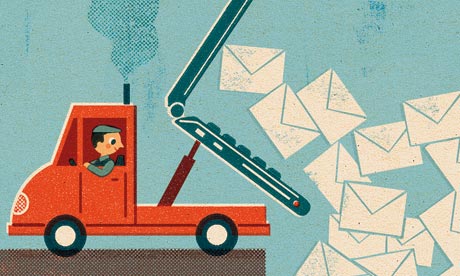
There's a new add-on for Gmail called Inbox Pause, which does something utterly simple – it adds a pause button to your inbox – but represents, I think, a new phase in our long war against information overload. Consider the absurdity. Inbox Pause doesn't reduce the quantity of emails that bombard you. Nor does it help you answer them faster. In any case, there's already a perfectly good way to "pause" your email: just don't check your damn email for a few hours. Or just resist the temptation to open new ones. But we're too weak-willed for that: instead we need a button that tricks us into thinking we're controlling the deluge. In short, Inbox Pause is an innovation for which there's no rational need, which treats its users like impulsive toddlers. To any self-disciplined adult, it's an insult.
I've been using it for several weeks now, and I love it.
Forty years after Alvin Toffler popularised the term "information overload", we might as well admit this: our efforts to fight it have failed. Unless you're willing to be radical – to give up the internet completely, say – the recommended cures don't work. Resolve to check your email twice daily, and you'll find many more messages waiting when you do. Go on an "information diet", and it's likely to end like any other diet: you'll succumb and consume the bad stuff, with extra guilt. So maybe we need to reframe things. The real problem isn't too much information: it's the feeling of being out of control. Why not focus, then, on finding ways to feel more in control – even if that's based, in part, on self-deception?
When Google launched Priority Inbox, which sifts email into "important" and "everything else", I was sceptical: prioritisation systems mainly involve pointlessly reordering your to-do list. But friends who swear by it don't really use it to prioritise: they use it as a guiltless way to ignore the non-important emails entirely, and thus feel more in command. The Boomerang app, for Gmail and Outlook, lets you fling emails away, then have them redelivered later; while they're gone, things are calmer, even though your email burden hasn't changed. I do something similarly delusional with the hundreds of web pages I bookmark for later reading. These used to exert a subtle, anxiety-inducing tug on me. Now I capture a page in the note-taking application Evernote, label it with the tag "to read" and file it away. Frequently, I never read it. But it works: the information feels tamed. The tug is gone. I'm in control, so I'm happy.
This is irrational, but then the whole idea of getting stressed by information is suffused with irrationality. There are millions of information sources we could, in theory, keep up with, but only a few that we tell ourselves we must – and the distinction's pretty arbitrary. I try to answer all personal emails, but I don't worry about answering all personal Twitter messages. The pile of books-to-be-read on my desk glowers at me, but I never feel anxious about the vast amounts of reading matter waiting, undiscovered, on the web. So why not fight irrationality with irrationality? Worry less about reducing the information tide. Look instead for ways to reduce its stressfulness – and if that means fooling yourself with pause buttons, boomerangs and the like… who cares? In the war against overload, we need every weapon we can lay our hands on.
oliver.burkeman@theguardian.com
Follow Oliver on Twitter

